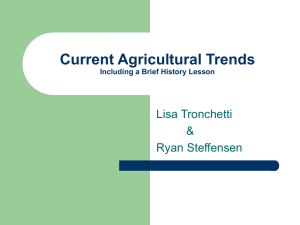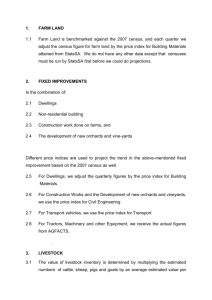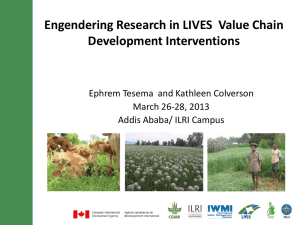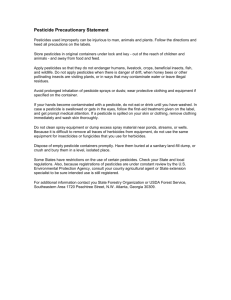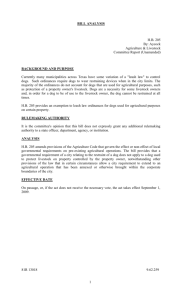ProposedRuleAttach2013-01354
advertisement
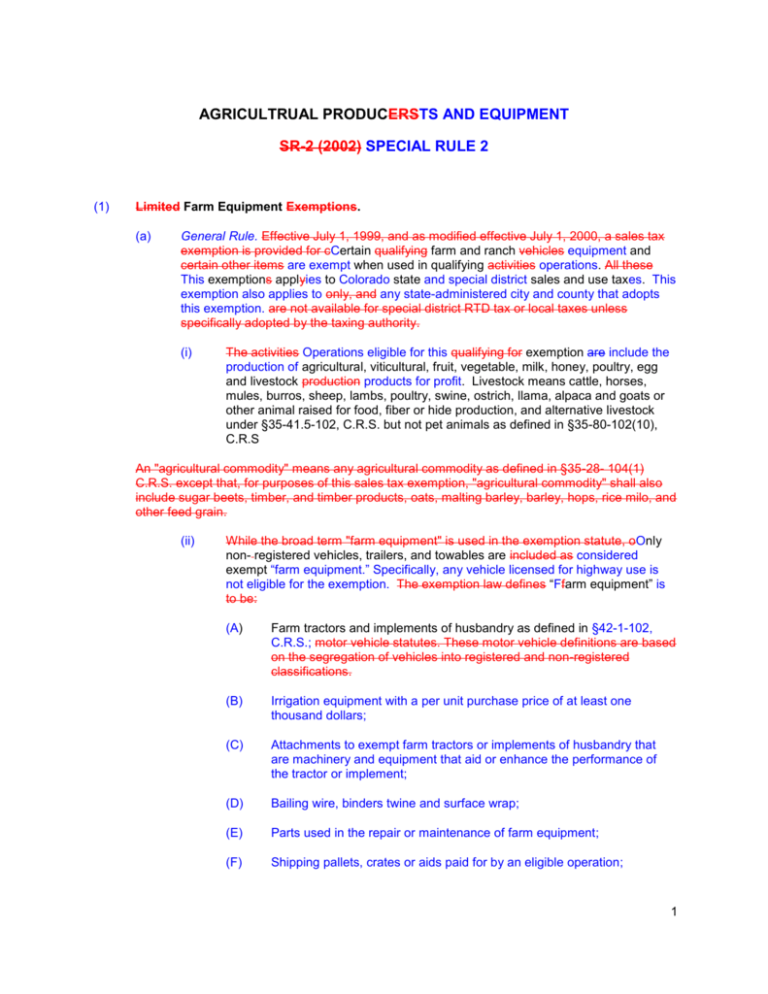
AGRICULTRUAL PRODUCERSTS AND EQUIPMENT SR-2 (2002) SPECIAL RULE 2 (1) Limited Farm Equipment Exemptions. (a) General Rule. Effective July 1, 1999, and as modified effective July 1, 2000, a sales tax exemption is provided for cCertain qualifying farm and ranch vehicles equipment and certain other items are exempt when used in qualifying activities operations. All these This exemptions applyies to Colorado state and special district sales and use taxes. This exemption also applies to only, and any state-administered city and county that adopts this exemption. are not available for special district RTD tax or local taxes unless specifically adopted by the taxing authority. (i) The activities Operations eligible for this qualifying for exemption are include the production of agricultural, viticultural, fruit, vegetable, milk, honey, poultry, egg and livestock production products for profit. Livestock means cattle, horses, mules, burros, sheep, lambs, poultry, swine, ostrich, llama, alpaca and goats or other animal raised for food, fiber or hide production, and alternative livestock under §35-41.5-102, C.R.S. but not pet animals as defined in §35-80-102(10), C.R.S An "agricultural commodity" means any agricultural commodity as defined in §35-28- 104(1) C.R.S. except that, for purposes of this sales tax exemption, "agricultural commodity" shall also include sugar beets, timber, and timber products, oats, malting barley, barley, hops, rice milo, and other feed grain. (ii) While the broad term "farm equipment" is used in the exemption statute, oOnly non- registered vehicles, trailers, and towables are included as considered exempt “farm equipment.” Specifically, any vehicle licensed for highway use is not eligible for the exemption. The exemption law defines “Ffarm equipment” is to be: (A) Farm tractors and implements of husbandry as defined in §42-1-102, C.R.S.; motor vehicle statutes. These motor vehicle definitions are based on the segregation of vehicles into registered and non-registered classifications. (B) Irrigation equipment with a per unit purchase price of at least one thousand dollars; (C) Attachments to exempt farm tractors or implements of husbandry that are machinery and equipment that aid or enhance the performance of the tractor or implement; (D) Bailing wire, binders twine and surface wrap; (E) Parts used in the repair or maintenance of farm equipment; (F) Shipping pallets, crates or aids paid for by an eligible operation; 1 (G) Aircraft designed or adapted to undertake agricultural applications. The agricultural application must be the primary use and not merely incidental; (H) Any item used at a dairy farm in connection with the production of raw milk. A commercial dairy farm that produces pasteurized or separated milk products for retail sale are not eligible. (I) For farm equipment to be exempt, there must be primary use must be with plants or livestock produced for profit. It does not include, for example, home gardens with incidental sales, weed mowing, petting zoos, stables for pleasure riding, trail riding or pack use of horses, mules, llamas, polo horses, etc. "Farm tractor" means every motor vehicle which is designed and used as a farm implement. "Implement of husbandry" means every vehicle that is designed, adapted or used for agricultural purposes. Thus, other than irrigation equipment, no fixed equipment is exempt, regardless of how movable or how often it is moved. Where plants, crops or livestock are brought to the equipment, the equipment remains taxable. [§§42-1- 102(33) and 42-1-102(44) C.R.S.] (II) Equipment eligible for the exemption includes, but is not limited to: hay balers, hay stacking equipment, combines, tillage and harvesting equipment, feed truck and other heavy movable farm equipment primarily used on farms and not on highways. Trailers specially designed to move such equipment on highways are considered component parts of such implements of husbandry. Vehicles taken into fields, corrals, etc., and moved about on the land to perform work with plants, crops or livestock are the items considered for exemption, with the other restrictions as noted below. Any vehicle licensed for highway use is disqualified. (iii) The pPurchased or leased equipment property must be used directly and primarily on a farm, ranch or at a "livestock production facility." It The equipment cannot be used incidentally for an agricultural use. , and not More specifically, for janitorial, building maintenance, office, sales, distribution (even of farm products), research, or transportation equipment and supplies, or construction materials for barns, corrals, etc. are not eligible use. (A) A "livestock production facility" means any structure used predominantly for the housing, containing, sheltering, or feeding of livestock, including, without limitation, barns, corrals, feedlots, and swine houses. [§39- 26102(5.7)] NOTE: Materials to construct barns, corrals, feedlots, etc., are not exempt from taxation. The purchase must be qualifying "farm equipment": Irrigation equipment having a per unit purchase price of at least $1,000, 2 Vehicles that qualify as implements of husbandry are those vehicles that are exempt from registration and are designed, adapted or used for agricultural purposes. An example would be a feed truck. Trailers designed to carry this equipment are also implements of husbandry, Attachments to exempt farm tractors or implements of husbandry that are machinery and equipment that aid or enhance the performance of the tractor or implement, Bailing wire, binders twine, surface wrap and, from July 1, 2000, pallets, from July 1, 2001 crates or similar items, Aircraft designed or adapted to undertake agricultural applications, but the agricultural application use must be the primary use and not merely incidental to a farm operation from July 1, 2000, Parts for maintenance and repair of the farm equipment that qualifies for exemption from July 1, 2000. Dairy equipment used at a dairy farm (and not in commercial milk production) qualifies for exemption from July 1, 2001. Exemption equipment also includes hay balers, hay stacking equipment, combines, tillage and harvesting equipment, and other heavy movable farm equipment primarily used on farms and not on highways. Trailers specially designed to move such equipment on highways are considered component parts of such implements of husbandry. [§42-1-102(44) C.R.S.] The purchase is not exempt if it is subject to registration as a vehicle under §42-3-103, C.R.S. or if its use is incidental to farm, ranch or livestock production facility operation. Leased farm equipment that otherwise qualifies under the above restrictions must have a fair market value of at least $1,000 in order to qualify for the exemption. (b) (2) Affidavit Required. Buyers must sign and complete the affidavit on specified by the Director Department Form DR 0511, testifying to their qualification for exemption. The form version dated 08/00 or later must be used for purchases after July 1, 2000. Vendors must retain the affidavit for three years from the date they file that month's sales tax return. The dDepartment may request copies of such affidavits at any time during that three year period. Buyers remain liable for tax, interest and any applicable penalties if the purchase is used in a manner that does not qualify for the exemption. Agricultural Compounds. (a) General Rule. All sales and use of agricultural compounds consumed by, administered to, or otherwise used in caring for livestock and all sales and purchases of semen for agricultural or ranching purposes are not subject to Colorado sales and use taxes. §39-2102(19)(c)(I), C.R.S. Sales of these products are treated as wholesale sales and, therefore, are exempt. (i) Agricultural compounds mean: (A) Insecticides, fungicides, growth-regulating chemicals, enhancing compounds, vaccines and hormones; (B) Drugs used for the prevention or treatment of disease or injury in livestock; and 3 (C) (b) Animal pharmaceuticals approved by the federal Food and Drug Administration. Non-Qualifying Uses. Agricultural compounds not used in the caring of livestock are subject to state and local sales and use taxes, unless they qualify as a non-taxable pesticide (see, “Pesticides,” below). For example, insecticides or fungicides used for the production or storage of feed crops for livestock does not constitute “caring for livestock,” and, therefore, are taxable unless they meet the three conditions required for the pesticide exemption, below. Domesticated animals are not livestock and, therefore, insecticides and fungicides used in connection with the caring of such animals are subject to tax. Insecticides and fungicides for use at residences, restaurants, and commercial office buildings are subject to tax because these uses do not qualify as the caring of livestock. (3) Spray Adjuvants. Beginning July 1, 2012, the sale or use of a spray adjuvant, which is a product used to increase the effectiveness a pesticide, is not taxable if used in the caring of livestock. See, §39-2-102(19)(c)(1), C.R.S. However, a spray adjuvant used for a purpose other than the caring of livestock is taxable, even if the pesticide used with the spray adjuvant is not taxable. For example, a spray adjuvant used with an insecticide to kill insects harmful to crops is taxable because the adjuvant is not used for the caring of livestock, even if the insecticide qualifies as a non-taxable pesticide. (4) Pesticides. (a) General Rule. Sales of pesticides are not subject to state sales and use taxes if the pesticide is: (i) Used in the “production” of agricultural or livestock products, (ii) Registered by the Colorado Commissioner of Agriculture under the Pesticide Act (§35-9-101 et seq., C.R.S), and (iii) Purchased from a dealer licensed by, and registered with, the Colorado Commissioner of Agriculture pursuant to §35-9-115, C.R.S. The sale of a pesticide must meet all three conditions to be non-taxable (A) (b) Insecticides and fungicides, which are both a type of pesticide, that do not satisfy each of these three conditions are, nevertheless, not subject to tax if they are used for the caring of livestock. See, “Agricultural Compounds” discussed above. “Production” of agricultural and livestock products. Pesticides must be used in the “production” of agricultural or livestock products. For example, pesticides used by a farmer to kill microbes or insects harmful to crops, or used by a rancher to kill rodents feeding on feed grain, are not taxable because these uses constituent an integral activity in the “production” of agricultural products. (i) Qualifying uses. Agricultural and livestock operations that produce a product include, but are not limited to: farming, ranching, orchards, vineyards, fisheries, dairies, greenhouses used for growing agricultural products, breeding facilities for livestock, feed lots, and turf farms. However, pesticides used in these operations but used for a non-production activity are subject to tax, unless the pesticide 4 qualifies as a non-taxable agricultural compound (see, “Agricultural Compounds” discussed above). (ii) Non-production activities associated with production operations. Non-production operations and activities are generally those that occur after harvest or after livestock is ready for market and include, but are not limited to: post-production storage facilities (e.g., silos, grain bins, fruit and vegetable storage facilities, machinery storage), grain elevators, milling and processing plants, livestock sale yards, slaughterhouses, nurseries at which nursery stock is primarily held for sale and not for propagation or growing, distribution facilities (e.g., trucking or railroad companies that haul agricultural product or livestock to market), retail stores for agricultural and livestock products (e.g., grocery stores, farmer markets, floral shops). (A) (iii) Post-Production Uses of Agricultural Compounds. Agricultural compounds do not have to be used in the “production” of livestock to be non-taxable. These products only have to be consumed by, administered to, or otherwise used in caring for livestock. Therefore, insecticides used in non-production activities, such as livestock saleyards and trucking companies transporting livestock, are not taxable. Non-qualifying uses. Operations that do not qualify as the production of agricultural or livestock products include, but are not limited to, domestic animal breeding or boarding, horse riding clubs or facilities, rodeos, zoos, restaurants, apartments, office buildings, residential use, and animals that are not used to produce food or fiber (e.g., animals owned as pets or by zoos). Pesticides sold for residential use are presumed to be taxable, but a residential user may apply for a refund if it can be established that the pesticide is primarily used on vegetable gardens, fruit trees or in the production of livestock. (c) Registered by the Commissioner of Agriculture. The Colorado Commissioner of Agriculture maintains a list of registered pesticides. See, §35-9-108(5), C.R.S. Pesticides that are registered but whose use is restricted or limited by the Commissioner qualify as registered pesticides. (d) Purchased from a dealer licensed by and registered with the Commissioner. The pesticide must be purchased from a dealer who is both licensed by, and registered with, the Colorado Commissioner of Agriculture. Retailers selling pesticides in Colorado who are not licensed by the Colorado Commissioner of Agriculture must collect, and purchaser must pay, sales tax on the sale of all pesticides sold/purchased, even if a pesticide is registered by the Commissioner. Similarly, persons who are eligible for the purchase of pesticides at wholesale because they use the pesticide in the production of agricultural or livestock products (e.g., pesticide applicators, farmers, ranchers), but purchase the pesticide from a pesticide dealer who is not licensed by the Colorado Commissioner of Agriculture must pay Colorado sales or use tax on the pesticide, even if the pesticide is registered by the Commissioner. (i) Examples. Company is the business of purchasing and applying pesticides for farmers located in Colorado, and does not separately state the price for the pesticides on the invoice. Company is considered the user of such pesticides and is liable for Colorado use tax if the company purchases the registered pesticides from an out-of-state retailer who is not licensed by the Colorado Commissioner of Agriculture. (Retailers, including out-of-state retailers, wishing to register as a licensed pesticide dealer should contact the Colorado Department of Agriculture.) 5 (ii) (e) (5) (6) If a farmer, rather than a pesticide applicator, purchases the registered pesticide from an unlicensed pesticide dealer and applies it, or hires a third-party to apply the pesticide, then the farmer is considered the purchaser and user of the pesticide (rather than the pesticide applicator) and must pay use tax. Suspension of Pesticide Exemption. The exemption from state sales and use taxes for pesticides was suspended from March 1, 2010 to June 30, 2012. If pesticides were purchased on or between these dates and the buyer or user did not pay Colorado sales or use tax, then buyer or user must file a Consumer Use Tax Return to report and pay the tax, unless the pesticide qualified for the agricultural compound exemption (the agricultural compound exemption was not suspended). The suspension of the pesticide exemption also applied to the sales and use taxes of state-administered special districts (e.g., RTD/CD and Rural Transportation Authorities), but did not apply to stateadministered city and county sales taxes (i.e., sales of pesticides remain exempt from the sales taxes of state-administered cities and counties that elected to exempt such sales). See, §39-26-212, C.R.S. State-Administered Local Sales and Use Taxes. (a) Prior to July 1, 2012, sales and use of pesticides were exempt from the sales taxes of state-administered cities and counties, unless the city or county elected to tax such sales. These local tax jurisdictions did not have the option to tax agricultural compounds that were exempt from state sales and use taxes. §29-2-105(1)(h), C.R.S. (b) Beginning July 1, 2012, sales of pesticides were removed from the local taxation option. Pesticides are now exempt from state, state-administered local jurisdictions and special district sales and use taxes in all cases. These rules do not apply to sales and use taxes administered by home rule cities. Recording Sales of Pesticides, Agricultural Compounds and Spray Adjuvants. (a) Retailer’s Due Diligence. Retailers who do not collect sales tax on pesticides, agricultural compounds or spray adjuvants must maintain documentation that clearly demonstrates a good faith effort to determine whether such sales are not subject to tax. In cases where it is unclear, the retailer must collect sales tax and the purchaser can apply for a refund. The following is a list of some of the more typical transaction that the Department will presume are taxable: (i) (ii) Sales to: (A) Homeowners. Retailers whose customer base has a significant residential base will be presumed to be selling to residential users. (B) Apartment or commercial building management companies. (C) Restaurants. (D) Persons engaged in the application of these products primarily to residential or commercial buildings. (E) Kennels. Sales made by check or credit card whose business name does not clearly indicate an agricultural or livestock purpose that is consistent with the 6 requirements of the exemption (e.g., sale of rodentcide (a pesticide) to off-farm agricultural warehouse or to a meat processing company is presumed taxable). (iii) Sales of spray adjuvants to farmers. (7) Seeds and Orchard Trees. The sale of seeds and orchard trees are exempt from sales and use tax only if they are used in a commercial enterprise and are not exempt if purchased to grow or produce food products for consumption by the purchaser. §39-26-716(4)(b), C.R.S. (8) Definitions. (a) "Poultry" means domesticated birds kept for eggs and meat. (b) "Feed for livestock" means all materials which are distributed for use as feed or for mixing in feed for "livestock" as defined above; but, "feed for livestock" does not include individual doses or injections of non-prescription drugs used or sold for use for other than nutritional purposes. SALES AND USE TAX EXEMPTION ON PESTICIDES Effective July 1, 1999, purchases of pesticides or other substances registered by the Colorado Commissioner of Agriculture as agricultural use pesticides under the Pesticide Act (C.R.S. 39-9-101 et. Seq.) are exempt from state sales and use tax and any special district sales and use tax when purchased from a dealer licensed and registered under section 35-9-115 of the act. Substances not registered for agricultural use are taxable and any purchase from a nonregistered dealer is taxable. Licensed pesticide dealers can inform their customers about pesticides that are registered under the Pesticide Act. And any pesticide qualified for agricultural use will have a statement on the packaging in the "Worker Protection Box," or in the "Directions for Use." Contact the Colorado Department of Agriculture, to obtain the "Restricted Use Pesticides Dealers List." This exemption applies to state sales and use tax only. Unless cities and counties have adopted an ordinance or resolution to exempt pesticides, local taxes are due on the purchase or sale of pesticides. Refer to "Colorado Sales/Use Taxes" (DRP 1002), published by the Department of Revenue to determine if a city or county has allowed this exemption. "Home-rule" cities are also listed in the DRP 1002. Some home-rule cities enact their own sales tax ordinances and collect their own taxes. Contact home-rule cities directly for their rules regarding sales taxes. SALES AND USE TAX EXEMPTION ON AGRICULTURAL COMPOUNDS Effective July 1, 1999, all sales and purchases of agricultural compounds that are consumed by, administered to, or otherwise used in caring for livestock are exempt from Colorado state sales and use tax; state-collected local sales and use tax and any special district sales and use tax. This exemption also applies to all sales and purchases of semen for agricultural or ranching purposes. "Agricultural compounds" means: 7 Insecticides, fungicides, growth-regulating chemicals, enhancing compounds, vaccines, and hormones; Drugs, whether dispensed in accordance with a prescription or not, that are used for the prevention or treatment of disease or injury in livestock; and Animal pharmaceuticals that have been approved by the Food and Drug Administration The exemption for these compounds only applies to using the compounds in caring for livestock. Any of these compounds may be taxable when used in agriculture, unless exempted under another specific provision. Home-rule/self-administered cities enact their own sales tax ordinances and collect their own taxes. Contact these cities directly for rules regarding sales taxes. For a list of home-rule cities, refer to "Colorado Sales/Use Taxes" (DRP 1002). GENERAL ISSUES "Agricultural producer" means a person regularly engaged in the business of using land for the production of an agricultural commodity or livestock. The term includes persons engaged in agricultural, viticultural, fruit, vegetable, milk, honey, poultry, egg and livestock production. Livestock means cattle, horses, mules, burros, sheep, lambs, poultry, swine, ostrich, llama, alpaca and goats or other animal raised for food, fiber or hide production, and alternative livestock under §35-41.5-102, C.R.S. but not pet animal as defined in §35-80-102(10), C.R.S. An "agricultural commodity" means any agricultural commodity as defined in §35-28-104(1) C.R.S. except that, for purposes of this sales tax exemption, "agricultural commodity" shall also include sugar beets, timber, and timber products, oats, malting barley, barley, hops, rice milo, and other feed grain. "Agricultural producer" does not include a person who breeds or markets animals, birds, or fish for domestic pets nor a person who cultivates, grows, or harvests plants or plant products primarily for his own consumption. Containers, crates, pallets, labels, and furnished shipping cases purchased by an agricultural producer are not subject to tax. "Containers" and "shipping cases" that are exempt when sold to agricultural producers include wire, twine, rope, tape, and similar binding materials, together with any other material or product used to wrap, bag, bundle, or similarly contain products. Fertilizer purchased by an agricultural producer is not subject to tax. "Fertilizer" includes compounds of nitrogen, phosphorus, potassium, trace elements or similar materials or substances which provide essential plant food elements and which become ingredients of the growing plant. "Fertilizer" does not include soil, sand, peat moss, limestone, mulches and similar materials primarily used to condition the soil or to preserve or facilitate plant growth, regardless of incidental nutritive value; therefore, purchases of such things are taxable Cross Reference(s) 1. See Department Form 1002 for a list of state-administered cities and counties. 2. Pesticides that are registered but whose use is restricted or limited by the Commissioner qualify as registered pesticides. For more information, visit the Colorado Department of Agriculture’s website at http://www.colorado.gov/ag/ > Plants. 8 3. To obtain a list of registered pesticides and pesticide dealers, contact the Colorado Department of Agriculture at (303) 239-4100, or go to the Colorado Department of Agriculture’s website at www.colorado.gov/ag. 4. Vendors must require the purchasers of farm equipment to sign and complete the affidavit on Department Form DR 0511. 9


